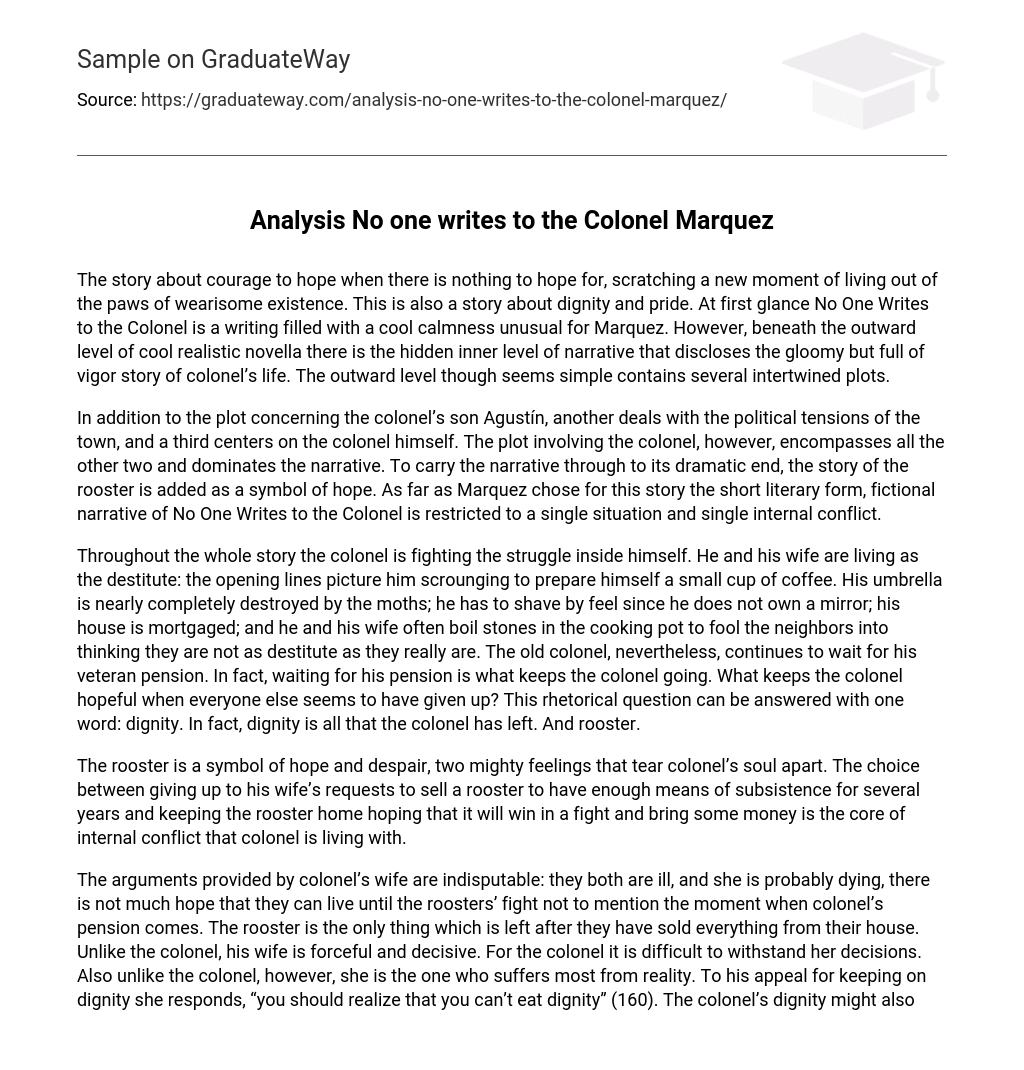The story about courage to hope when there is nothing to hope for, scratching a new moment of living out of the paws of wearisome existence. This is also a story about dignity and pride. At first glance No One Writes to the Colonel is a writing filled with a cool calmness unusual for Marquez. However, beneath the outward level of cool realistic novella there is the hidden inner level of narrative that discloses the gloomy but full of vigor story of colonel’s life. The outward level though seems simple contains several intertwined plots.
In addition to the plot concerning the colonel’s son Agustín, another deals with the political tensions of the town, and a third centers on the colonel himself. The plot involving the colonel, however, encompasses all the other two and dominates the narrative. To carry the narrative through to its dramatic end, the story of the rooster is added as a symbol of hope. As far as Marquez chose for this story the short literary form, fictional narrative of No One Writes to the Colonel is restricted to a single situation and single internal conflict.
Throughout the whole story the colonel is fighting the struggle inside himself. He and his wife are living as the destitute: the opening lines picture him scrounging to prepare himself a small cup of coffee. His umbrella is nearly completely destroyed by the moths; he has to shave by feel since he does not own a mirror; his house is mortgaged; and he and his wife often boil stones in the cooking pot to fool the neighbors into thinking they are not as destitute as they really are. The old colonel, nevertheless, continues to wait for his veteran pension. In fact, waiting for his pension is what keeps the colonel going. What keeps the colonel hopeful when everyone else seems to have given up? This rhetorical question can be answered with one word: dignity. In fact, dignity is all that the colonel has left. And rooster.
The rooster is a symbol of hope and despair, two mighty feelings that tear colonel’s soul apart. The choice between giving up to his wife’s requests to sell a rooster to have enough means of subsistence for several years and keeping the rooster home hoping that it will win in a fight and bring some money is the core of internal conflict that colonel is living with.
The arguments provided by colonel’s wife are indisputable: they both are ill, and she is probably dying, there is not much hope that they can live until the roosters’ fight not to mention the moment when colonel’s pension comes. The rooster is the only thing which is left after they have sold everything from their house. Unlike the colonel, his wife is forceful and decisive. For the colonel it is difficult to withstand her decisions. Also unlike the colonel, however, she is the one who suffers most from reality. To his appeal for keeping on dignity she responds, “you should realize that you can’t eat dignity” (160). The colonel’s dignity might also be seen as lack of character, as his own wife tells him (163). Finally at certain moment colonel almost surrenders to her requests and decides he must sell the rooster. However, when he arrives at the home of the rich man in town, Sabas, in order to do so, “he wished he had arrived an hour later and missed Sabas” (165). Here we see that still colonel acts against his will. That time when he waits for Sabas in a hall is the most difficult period, the culmination, of his internal conflict.
Fortunately the town’s doctor supports the old colonel’s insistence on keeping the rooster as well as colonel’s son’s friends and the townsfolk at large as they all put their hopes on the rooster. The rooster for them is the only thing that may distract their thoughts from the tension brought about by the police and the town’s martial law. And I agree with them as it seems like the main reason why colonel reserves his son’s rooster to himself and doesn’t want to sell him, and the same reason why he keeps hoping for his pension, is to find a meaning of living beyond the mere fact of eating. But will the rooster win the fight that is yet to take place and thus justify at least some of the colonel’s hopes? We have to decide it independently because the story ends before the rooster is scheduled to fight, at the point when the old colonel decides to keep the rooster. When his wife running out of possible arguments, and losing control asks “and meanwhile what do we eat?” (181) the colonel, without losing his composure, and obviously feeling rather invincible, quietly answers “Shit” (181).
The main lesson to be learned from this story is that even amidst the most arid living circumstances it is very important to preserve human dignity and not to lose hope. The hope gives man the strength to live through the most difficult and uncertain moments in life.
Referene List
Marquez, Gabriel Garcaia. (1990) Collected Novellas: Leaf Storm, No One Writes to the Colonel, Chronicle of a Death Foretold. Trans. Gregory Rabassa and J. S. Bernstein. New York: HarperCollins.





